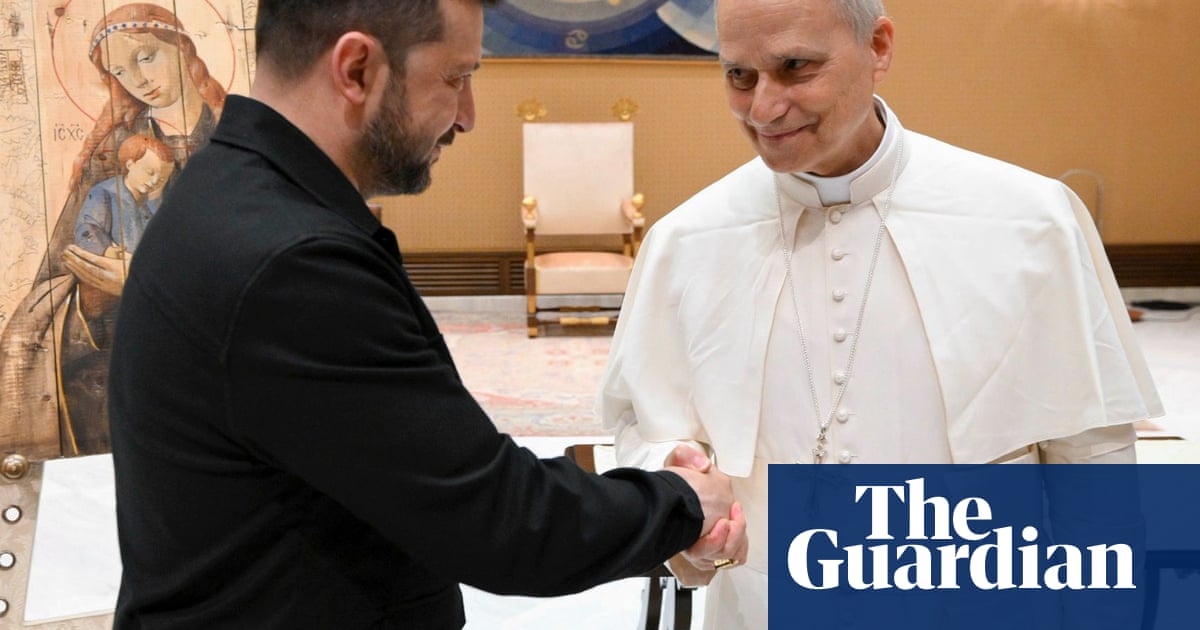Pope Leo confirmed to Giorgia Meloni his willingness to host in the Vatican the next round of negotiations to try to end the war between Russia and Ukraine, the Italian prime minister said on Tuesday.“Finding in the Holy Father confirmation of the readiness to host the next talks between the parties in the Vatican, the prime minister expressed deep gratitude to Pope Leo XIV for his unceasing commitment to peace,” said a statement from Meloni. Leo, elected two weeks ago, said on 14 May that the Vatican could act as a mediator in global conflicts, without specifically mentioning Russia’s war against Ukraine.
Separately the Italian prime minister said she had talks with otherEuropean leaders and the Ukrainian president, Volodymyr Zelenskyy, over next steps.“It was agreed to maintain close coordination between the partners with a view to a new round of negotiations aimed at a ceasefire and a peace agreement in Ukraine.”
Zelenskyy accused Russia of “trying to buy time” to continue the war, a day after the US president, Donald Trump, discussed the war with the Russian president,Vladimir Putin. Their two-hour phone call, asPeter Beaumont and Pjotr Sauer write, failed to deliver any meaningful concessions from Moscow.The Germandefence minister,Boris Pistorius,also accused VladimirPutin of “playing for time” and not really being interested in peace in Ukraine.
In its regular assessment, theInstitute for the Study of Warsaid on Tuesday: “Russia must explicitly acknowledge the legitimacy of the Ukrainian president, government, and constitution and Ukraine’s sovereignty in order to engage in meaningful, good-faith negotiations.” Putin must also agree to a ceasefire before negotiation of a final peace settlement. The ISW saidRussia was trying to expand its list of demands when it should be preparing to make concessions.
After theEuropean Unionon Tuesday adopted its 17th round ofsanctions against Russia centred on the “shadow fleet” of oil tankers, human rights violations and hybrid threats, the European Commission president, Ursula von der Leyen,said a further, 18th package was already being prepared with further “hard-hitting” measures. The UKgovernment has also announced100 new sanctions on Russiaacross Russian military, energy, financial sectors and those conducting “Putin’s information war against Ukraine”.
TheUS secretary of state, Marco Rubio, said he expected Russia within days to present broad outlines for a ceasefire with Ukrainethat would let the US assess whether Moscow is serious. “At some point here fairly soon – maybe in a number of days, maybe this week hopefully – the Russian side is going to present the terms,” Rubio told a Senate hearing.
At leastone civilian was killed and 13 injured in Russian attacksacross Ukrainian regions over the previous day, regional authorities said on Tuesday. The ISW assessed thatUkrainian forces have recently advanced in Kursk oblast and near Borova and Toretsk; while Russian forces recently advanced in Kursk oblast and near Chasiv Yar, Toretsk, and Novopavlivka.
Ukraine’s military said it has launched anotherinvestigation into the “Anne of Kyiv” brigade, trained in France,after a media report alleged financial misconduct among some commanders, Agence France-Presse (AFP) reported.
The Ukrainianforeign minister,Andriy Sybiha, called on the G7 to reduce its price cap on Russian seaborne oil to $30 per barrel.The current cap is $60. Ukraine is attending G7 talks in Canada this week.
